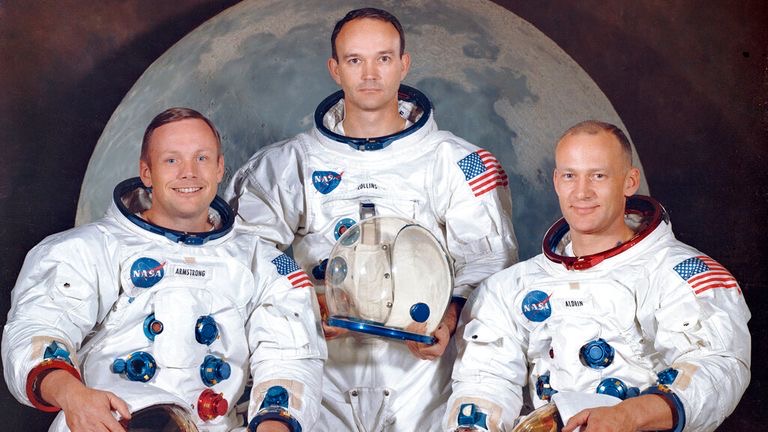Apollo 11 Moon Landing Astronaut, Michael Collins Dies At 90
 Michael Collins, command pilot of the first crewed mission to the moon, has died at 90 following a “valiant battle” with cancer.
Michael Collins, command pilot of the first crewed mission to the moon, has died at 90 following a “valiant battle” with cancer.
Collins was traveled with the first two people to land on the Moon, Neil Armstrong, and Edwin ‘Buzz’ Aldrin.

Neil Armstrong died on August 25, 2012, while Buzz Aldrin is 90 and living in Florida.
Collins was called the “forgotten astronaut” because he piloted the orbiting command module while his crew-mates made the historic first moon landing in 1969.
A family statement said he died on Wednesday “after a valiant battle with cancer” and had “spent his final days peacefully, with his family by his side“.
The statement added;
We will miss him terrible. Yet we also know how lucky Mike felt to have lived the life he did. Please join us fondly in remembering his sharp wit, his quiet sense of purpose, and his wise perspective, gained both from looking back from Earth from the vantage of space.
We regret to share that our beloved father and grandfather passed away today, after a valiant battle with cancer. He spent his final days peacefully, with his family by his side. We will miss him terribly.
Please join us in fondly and joyfully remembering his sharp wit, his quiet sense of purpose, and his wise perspective, gained both from looking back at Earth from the vantage of space and gazing across calm waters from the deck of his fishing boat.
On July 16, 1969, Collins was launched to the Moon in the Apollo 11 mission with commander Neil Armstrong and lunar module pilot, Edwin Aldrin.
Armstrong and Aldrin landed on the Moon in the lunar module Eagle on July 20 while Collins remained in the command module Columbia, circling the Moon at an altitude of 97–121 km (60–75 miles).
Collins travelled about 238,000 miles to the moon and came within 69 miles – but never set foot on it.
Instead, he spent almost a day in orbit while Aldrin and Armstrong were on the surface.
He said he wasn’t lonely and felt like an important part of the mission as his speciality was as a command module pilot.
Collins spent 48 minutes in each orbit on the “far side of the moon” and in that time lost communication with mission control. Be said he felt “awareness, anticipation, satisfaction, confidence, almost exultation“.
During orbit he mostly performed chores, as well as keeping an eye out for the Eagle lunar module in preparation to meet it again.
After more than 21 hours on the moon’s surface, Armstrong and Aldrin lifted off and rejoined Collins on the Columbia command module.
In his autobiography, he stated;
I know that I would be a liar or a fool if I said that I have the best of the three Apollo 11 seats, but I can say with truth and equanimity that I am perfectly satisfied with the one I have.
This venture has been structured for three men, and I consider my third to be as necessary as either of the other two.
Armstrong Air & Space Museum tweeted its condolences saying;
Neil gained another crew member today”.The Armstrong Air & Space Museum is deeply saddened to learn of the passing of #Apollo11 astronaut Michael Collins. We take comfort in knowing that Neil Armstrong now has another crew member and friend in the exploration of this final frontier.
The Armstrong Air & Space Museum is deeply saddened to learn of the passing of #Apollo11 astronaut Michael Collins. We take comfort in knowing that Neil Armstrong now has another crew member and friend in the exploration of this final frontier.
Ad Astra 💫Michael pic.twitter.com/oBLCqFAGQg
— Armstrong Air & Space Museum (@ArmstrongSpace) April 28, 2021
The enormous achievement of Apollo 11 was repeated only six more times before NASA scrapped the programme, and humans haven’t stepped foot on the moon since Apollo 17 in 1972.
NASA planned to land the first woman and the next man on the moon by 2024. However, that date was recently described as “unlikely” by an internal report.
